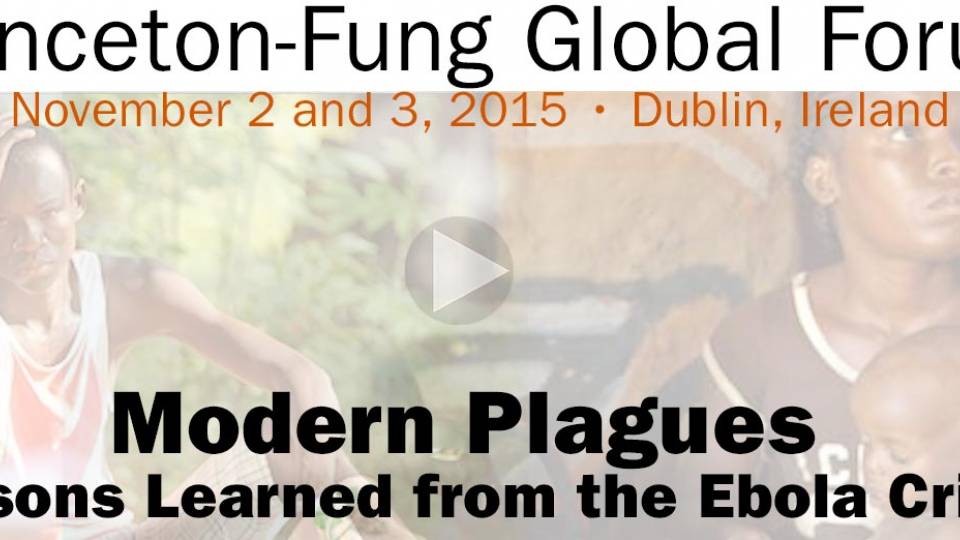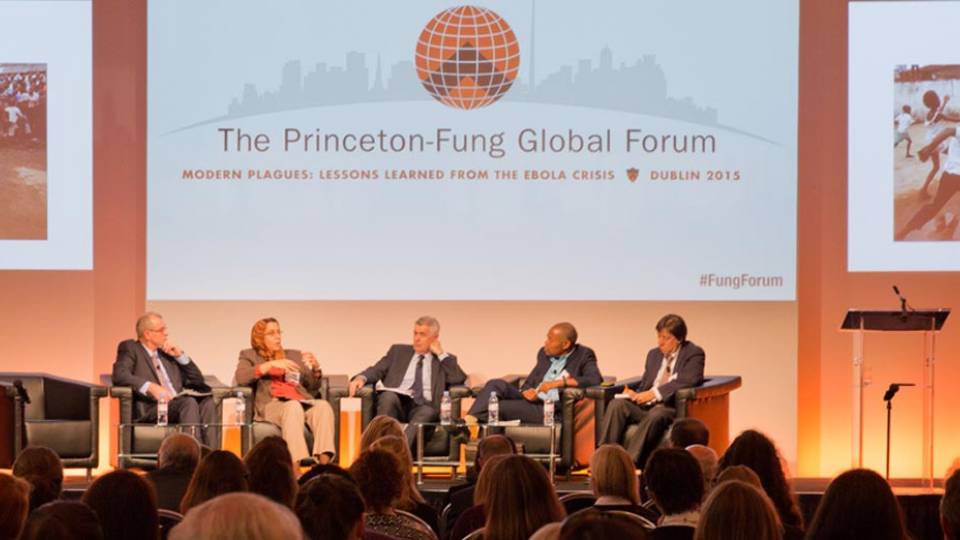The third annual Princeton-Fung Global Forum will bring together researchers, scholars, policymakers and health officials in November to examine West Africa's Ebola outbreak as a case study of a modern plague.
The event, to be held Nov. 2-3 in Dublin, Ireland, will highlight the multidisciplinary approach needed to resolve the crisis, involving not only public health and medical knowledge but an understanding of its economic, environmental, political and historical roots and consequences. The conference, "Modern Plagues: Lessons Learned From the Ebola Crisis," will also look ahead to ways to avoid and address future crises.
"The Princeton-Fung Global Forum will convene leading practitioners and thinkers with a breadth of expertise to advance our understanding of the magnitude of the Ebola crisis and its implications for the future," said Princeton President Christopher L. Eisgruber. "This will be an important gathering with a far-reaching impact."
The forum, which will be held at University College Dublin, is organized by Princeton's Woodrow Wilson School of Public and International Affairs in coordination with partners across campus including the Center for Health and Wellbeing, the Office of Development, Conference and Event Services, and the Office of Communications. Registration, which is required, begins April 15.
The Princeton-Fung Global Forum was established in 2012 as part of a $10 million gift from William Fung, a 1970 Princeton graduate and former University trustee who is group chairman of the Hong Kong-based company Li & Fung.
The first forum was held in 2013 in Shanghai on "The Future of the City." The second forum, held in April in Paris, focused on the future of higher education.
This year's conference will include keynote addresses by:
• Jeremy Farrar, director of the Wellcome Trust and professor of tropical medicine at the University of Oxford;
• Peter Piot, director of the London School of Hygiene and Tropical Medicine and a microbiologist known for research into Ebola and AIDS; and
• Mary Robinson, former president of Ireland, founder of the Mary Robinson Foundation-Climate Justice, and United Nations special envoy for climate change.
Panel topics will include "The History of Plagues," "The Science of Plague," "Disease and the Information Highway," "The Politics of Plague," "Follow the Money," and "After the Plague."
"History has taught us that it is critically important to contain a health crisis before it becomes a pandemic that results in a huge loss of life. But we don't always know how," said Cecilia Rouse, dean of the Wilson School, the Lawrence and Shirley Katzman and Lewis and Anna Ernst Professor in the Economics of Education, and a professor of economics and public affairs. "This forum brings together some of the best minds in global health to examine ways that plagues can be prevented and contained more effectively."
Along with Eisgruber and Rouse, Princeton University speakers on the program include:
• João Biehl, the Susan Dod Brown Professor of Anthropology and co-director of Princeton's Program in Global Health and Health Policy;
• Anne Case, the Alexander Stewart 1886 Professor of Economics and Public Affairs and director of the Research Program in Development Studies;
• Janet Currie, the Henry Putnam Professor of Economics and Public Affairs, chair of the Department of Economics, and director of the Center for Health and Wellbeing;
• Angus Deaton, the Dwight D. Eisenhower Professor of International Affairs and professor of economics and international affairs;
• Edward Felten, the Robert E. Kahn Professor of Computer Science and Public Affairs;
• Bryan Grenfell, the Kathryn Briger and Sarah Fenton Professor of Ecology and Evolutionary Biology and Public Affairs;
• Amaney Jamal, the Edwards S. Sanford Professor of Politics and director of the Mamdouha S. Bobst Center for Peace and Justice;
• Adel Mahmoud, a senior policy analyst and lecturer with the rank of professor at the Wilson School and Department of Molecular Biology;
• Carolyn Rouse, a professor of anthropology;
• Matt Salganik, a professor of sociology;
• Thomas Shenk, the James A. Elkins Jr. Professor in the Life Sciences and co-director of Program in Global Health and Health Policy;
• Keith Wailoo, the Townsend Martin Professor of History and Public Affairs and vice dean of the Wilson School; and
• Leonard Wantchekon, a professor of politics.
Other participants will come from Oxford University, University College Dublin, the Centers for Disease Control and Prevention, the University of Ghana, the U.S. Navy, the American Red Cross, UNICEF Innovations, Doctors Without Borders, Department of International Development, International Rescue Committee, USAID's Disaster Assistance Response Team, Last Mile Health, Harvard Medical School, and the Wellbody Alliance. Panel moderators will be from The Lancet, The Washington Post, National Public Radio and The New York Times.
More information on the 2015 forum, as well as links to information on the earlier events, is available on the Princeton-Fung Global Forum website.

